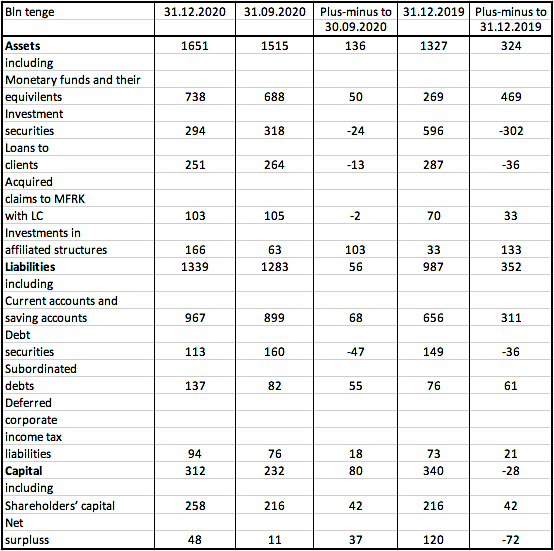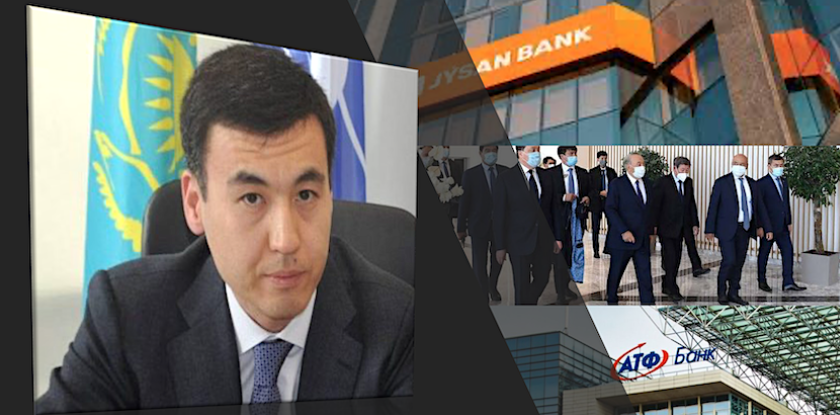The business op on the sale of ATF Bank via its merger with Jýsan Bank is near completion. As expected, the total volume of the two banks’ assets will amount to 3 trillion tenge while their market share will constitute 10% of the assets of the banking sector. Guess who’s going to profit?
On December 30, 2020, the Agency of the Republic of Kazakhstan for Regulation and Development of Financial Market published «The Information Statement on the Purchase of ATF Bank by Jýsan Bank».
Here is the text of the document (text in bold by KZ.expert).
«In accordance with the Kazakh law, in order to complete the merger between ATF Bank JSC and the Jýsan Group, the Agency has approved the purchase of 99,76% of ATF Bank shares by Jýsan Bank JSC and the purchase of 19,97% of Jýsan Bank shares by Mr. Esenov G.Sh. Also, the parties to the transaction have received the National Bank of Kyrgyz Republic’s approval for the change of the shareholder in regard to Optima Bank JSC, ATF Bank’s affiliated structure.
The financial model of the merger corresponds to the classic M& A model when the bank’s own capital in the amount of 124 bln tenge was used to crate additional provisions. After the current shareholder had covered the losses, Jýsan Bank increased ATF Bank’s capital by 97 bln tenge thus forming the required volume of the capital. At the close of the transaction, ATF Bank has formed the required volume of provisions, has the required capital stock and liquidity cushion which ensures the bank’s financial sustainability and stable development in the long run.
The Agency believes that merging the business-models of two major Kazakh banks will help increasing the stability of the banking sector and improve the quality of the banking services via using the financial and technological advantages of the two banks. As expected, the total volume of the two banks’ assets will amount to 3 trillion tenge while their market share will constitute 10% of the assets of the banking sector».
We have already commented on this business op conducted by Nursultan Nazarbayev’s close relatives in the article titled «On the Sale of ATF Bank». Now we would like to present you a qualitative summation of the matter. Below, you will find a table that we have compiled on the basis of the official reports on Jýsan Bank’s financial standing.

It is not hard to see that, as of the end of 2020, Jýsan Bank JSC’s financial standing was quite solid. And since monetary funds and their equivalents constituted a little less than 50% of its assets (44.8% to be precise) whereas its loan portfolio constituted only 15,2%, it would be more correct to call this company a money bag instead of a bank.
And this bag is being controlled by Nursultan Nazarbayev’s family that can use it the way it wants.
In view of this, we would like to mention a phenomenon that, although registered by the Kazakh society, is not being discussed in the country’s information space in the slightest — any über big operation on bank rescuing in Kazakhstan would always end in one of Nazarbayev’s relative or ally becoming the owner after the bank’s financial situation had been normalised via a gigantic inflow of the state money.
There is no exception to this rule. And, given the conditions of the Kazakh authoritarian system, there cannot be.
From the point of view of a person’s psychology, this is as it should be: if a person controlled the state utterly and completely and the state had to spend a lot of money on saving a bank, it would be logical to hand it over to someone of their own instead of giving (selling) it to unfamiliar persons.
The case of Tsesnabank’s rescue, of putting it in order and then of its merger with (and saving of) ATF Bank serves as yet another confirmation that this is the way things are done in Kazakhstan. And that the interests of the single person and his family are much more important than the public interests.






